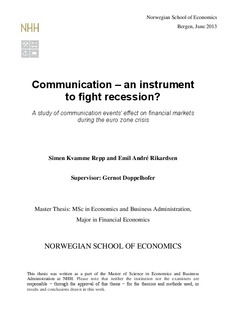Communication – an instrument to fight recession? : a study of communication events’ effect on financial markets during the euro zone crisis
Master thesis
Permanent lenke
http://hdl.handle.net/11250/170164Utgivelsesdato
2013-06Metadata
Vis full innførselSamlinger
- Master Thesis [4372]
Sammendrag
The purpose of this paper is to evaluate whether and how communication events have helped mitigate the current recession in the euro zone. We investigate how communication has influenced financial markets; both sovereign debt and stock markets in Europe. In particular, we evaluate events where important bailouts and stabilisation programmes have been announced, as well as speeches from prominent policy makers in the euro zone. We use a simple t-test to detect changes in the indicators on the event date, applying an event window of three days. We also test with an event window of ten days to evaluate the duration of effects.
Regarding announcements of rescue packages we find that markets to a large degree react to these, but as yield spreads tend to increase and stock markets decline, the effects are generally negative and persistent. These events induced the greatest fluctuations in stock markets.
All announcements of stabilization programmes had somewhat positive effects on financial markets, some of which are large in amplitude Programme announcements yielded the largest results in terms of absolute changes in yield spreads. Significant results in the three day event window, for the most part, prove to be persistent also in the ten day window. If we look further ahead however, we often find a negative bounce-back effect.
We find that communication affects financial markets, and can indeed be a helpful tool for ECB in solving the euro crisis. This, however, is conditional on the credibility and content of the message, as demonstrated by announcements in which no concrete measures are taken, where we argue that the success depends on whether the communication will be followed by action.
